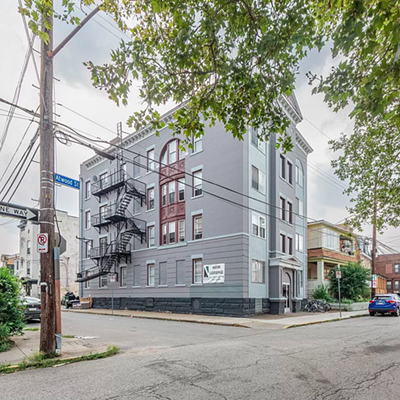The Garden's history is a sad one -- a family-friendly movie house that bore bitter fruit and became a porn theater. And while the theater was recently shuttered pending a redevelopment project, a few devotees still lament its loss.
"The Garden is gone," one poster on Craigslist recently wailed. "[N]ow where do I find NSA [No Strings Attached] blowjobs?"
Ah, the eternal question ...
Anyway. For a theater whose films revealed just about everything, the Garden rarely called attention to itself. It opened "without publicity" in 1915, according to a profile compiled as part of the Library of Congress' Historic American Building Survey. Its original owner was one David E. Park, a bank vice president. According to the HABS, the theater's name was chosen "as a pun on the name of the owner" (get it? Park? Garden?) so it wouldn't be confused with the Park Building Downtown.
Park passed away in 1917, and in 1924 his son sold the Garden to Bennett Amdur, who'd been managing the facility until that time. Amdur ran the Garden until his death in 1970, and left the interior essentially unchanged.
To be sure, Amdur made some concessions to the times. During the silent-film era, the auditorium was fitted out with a pipe organ -- the first organ to be seen inside the theater, but by no means the last. But the organ was later taken out, the HABS reports, and bestowed to a church. Amdur also later added amenities like central air conditioning.
But for the most part, the structure retained its 1920s-era furnishings, which Amdur had copied from a New York City theater. The Garden was built with an upstairs ice-cream parlor, elaborate lighting fixtures and its distinctive landmark marquee. To varying extents, all these features survive today. (Although the marquee outside was once even more elaborate; the original collapsed under a snowfall in January 1958.)
During his lifetime, Amdur insisted on showing only the most family-friendly entertainment. In a 1970 Pittsburgh Post-Gazette article published shortly after his death, the Garden's acting manager said Amdur "kept a clean place and wouldn't even show Frankenstein."
But three years later, the Garden was sold to "Penn-Ally Enterprises," which rechristened the building as the "New Garden Theater" and began showing adult films. Amdur, presumably, must have been spinning in his grave faster than a projector on rewind.
On the bright side, though, at least the New Garden didn't show Frankenstein either.
Adult theaters like the New Garden became common in 1970s, and not just because of permissive morals. Showing adult films was the only way many urban theaters could survive in the era of the suburban multiplex. During a 1999 hearing, Garden Theater manager Robert Caplan testified that the Garden had only two choices: Go X-rated, or go out of business. "We could no longer get [enough movies] to stay in business," the Pittsburgh Tribune-Review quoted Caplan saying. But when the fare was adult films, they made money "all the time."
But for North Siders, the Garden was a glaring symbol of how their community had gone to seed. In the mid-1990s the Mattress Factory, a nearby art museum, proposed a redevelopment plan in which the Garden would be used as a meeting, exhibition and community center. The city tried to seize the building through eminent domain, but in 1997, the Garden's then-owner, George Androtsakis of New York City, fought the seizure in court.
Legally speaking, Androtsakis never had a chance. The resulting legal battle was a lot like a film you might see at the Garden: The outcome was predictable; the only question was how many twists and turns there'd be along the way. Androtsakis displayed impressive staying power: He owns numerous adult theaters in the Northeast, and he's fought against government seizures elsewhere as well. His decade-long legal battle ended in February, and the redevelopment can finally begin.
In fact, city officials recently announced plans to put a new message up on the marquee: "The Return of the Garden/ Directed by [Mayor] Luke Ravenstahl." Those plans have irked some people, who point out that efforts to redevelop the site have been in the works for years. But to me, Ravenstahl's gesture seems fitting: How else are you going to say goodbye to a porn theater ... except to engage in one final, public act of self-satisfaction?










